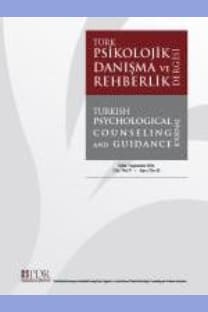Eğitim Sisteminde Önemli Bir Sorun: Okulu Bırakma
Okulu bırakma birçok ülkenin egitsel bir problemidir ve okulu bırakma oranını azaltma, bu ülkelerin egitim ile ilgili en önemli önceliklerinden biri haline gelmistir. Gerçekte, düsük okulu bırakma oranı, egitim sisteminin kalitesinin bir göstergesi olarak alınmaktadır. Bu çalısmanın temel amacı, okulu bırakma problemini,
okulu bırakma sürecini, okulu bırakmanın nedenlerini ve sonuçlarını tanıtmak ve de okulu bırakma sorununun önemine dikkat çekmektir. Okulu bırakmanın olumsuz sonuçları kisileri, aileleri ve de tüm toplumu degisik yollarla etkilemektedir. Bu durumun en önemli olumsuz sonuçları ise, düsük gelir, düsük vergi ve düsük meslek statüsü, issizlik, suçlu, uyumsuz ve antisosyal davranıslar, depresif ruh hali, intihar, toplumla bagın kopuk olması, düsük özsaygı ve olumsuz saglık göstergesidir.
Anahtar Kelimeler:
ANAHTAR KELİMELER: Okulu bırakma, okulu bırakmanın nedenleri, okulu bırakma süreci, okulu bırakmanın sonuçları
THE IMPORTANT PROBLEM IN EDUCATION SYSTEM: SCHOOL DROPOUT
School dropout is an educational problems of a lot of countries. To reduce dropout rate, is become one of the most important educational priorities of their nations. Actually, low dropout rate is used the indicator of quality of the school system. The main purpose of this article, to introduce school dropout problem with reason, process and results and take attention seriousness of problem. Most important negative consequences of school dropouts are extremely affecting induviduals, their families and all society with different ways. Possible negative consequences after dropping out are low income, low tax, low job status, unemployment, delinquent and antisocial behaviour, depressed mood, suicide, low commitmet with society, less self-esteem and poor level of health.
Keywords:
-,
___
- Barclay, J.R. ve Doll, B. (2001). Early Prospective Studies of the High School Dropout. School Psychology Quarterly, 16 (4), 357-369.
- Battin-Pearson ve Ark. (2000). Predictors of Early High School Dropout. A Test of Five Theories. Journal of Edecational Psychology, 92 (3), 568-582.
- Cairns, R.B., Crains, B.D. ve Neckerman, H.J. (1989). Early School Dropout: Configurations And Determenants. Child Development, 60, 1437-1452.
- Campbell, L.A. (2004). As Strong as the Weakest Link: Urban High School Dropout. High School Journal, 87 (2), 16-24.
- Cassel, R.N. (2003). A High School Drop-Out Prevention Program for the At-Risk Sophomore Students. Education, 123 (4), 649-659.
- Christenson, S.L. ve Thurlow, M.L. (2004). School Dropouts: Prevention Considetrations,
- Interventions and Challenges. Current Directions in
- Popular Group Types. Journal of School Pcychology, 41, 217-232.
- Fine, M. (1986). Why Urban Adolescents Drop Into And out of Public High School. Teachers College Record, 87, 393-409.
- Fortin, L., Marcotte, D., Potvin, P. ve Royer, E. (2006).Typology of Students at Risk of Dropping out of School: Description by personal, Family and School Factors. European Journal of Psychology of Education, 21 (4); 363-383.
- French, D.C. ve Conrad, J. (2001). School Dropout as Predicted by Peer Rejection and Antisosyal Behavior, Journal of Research on Adolescence, 11 (3), 225-244.
- Graeff-Martins, A.S., Oswald, S., Comassetto, J.O., Kieling, C.,Goncalves, R.R. ve Rohde, L.A. (2006). A Package of Intervention to Reduce School Dropout in Public Schools in a Developing Country. Europian Child and Adolescent Psychiatry, 15(8), 442- 449. Hausnek, E.A. (1994). School Quality, Achievement Bias and Dropout Behavior In Egypt. LSMS Woking paper. Washington, D.C.: The World Bank
- Hayes, R.L., Nelson J., Tabin, M., Pearson, G. ve Worthy, C. (2002): Using School Wide Data to Advocate for Students Success. Profesional School Counseling, 6 (2), 86-95.
- Hoz, R., Kainan, A. ve Reid, I. (2000). Negev - Bedouin Parents’views on the Reason for School Dropout. Research ın Education, 63, 68-81.
- Suh, S. ve Suh, J. (2007). Risk Factors and Levels of Risk for High School Dropouts. Profesional School Counseling, 10(3), 297-306.
- Suh, S., Suh, J. ve Houston, I. (2007). Perdictors of Categorical At-Risk High School Dropouts. Journal of Counseling And Development, 85, 196-203.
- Tebliğler Dergisi (2567-Aralık 2004). Milli Eğitim Bakanlığı Ortaöğretim Kurumları Sınıf Geçme ve Sınav Yönetmeliği. (14-01-2008 tarihinde meb.gov.tr. adre- sinden alınmıştır).
- Vitero, F.,Larocque, D., Janosz, M., ve Tremblay, R.E. (2001). Negative Social Expriences And Dropping out of School. Educational Psychology, 21 (4), 401- 415.
- ISSN: 1302-1370
- Başlangıç: 1990
- Yayıncı: -
Sayıdaki Diğer Makaleler
Deprem Stresi ile Başetme Stratejileri Ölçeğinin Geçerlik ve Güvenirlik Çalışmaları
Zeynep DENİZ YÖNDEM, Altay EREN
Psikolojik Belirtilerin Yordayıcısı Olarak Sosyal Destek ve İyilik Hali
Duygusal Zeka Mizah Tarzı ve Yaşam Doyumu:Üniversite Öğretim Elemanları Üzerine Bir Araştırma
Songül TÜMKAYA, Erdal HAMARTA, M. Engin DENİZ, Metehan ÇELİK, Birsel AYBEK
Aşka İliskin Tutum Biçimlerinin Olumlu ve Olumsuz Duyguları Yordayıcılığı
Modernizmden Postmodernizme Geçiş ve Pozitif Psikoloji
Çocuklar İçin Bilgisayar Oyun Bağımlılığı Ölçeği
Mehmet Barış HORZUM, Tuncay ARAS, Özlem ÇAKIR BALTA
Eğitim Sisteminde Önemli Bir Sorun: Okulu Bırakma
Psikolojik Dogum Sırası Bireylerin Stresle Basa Çıkma Stratejilerinin Yordayıcısı mıdır?
